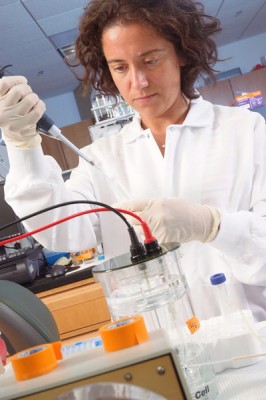
Alessandra Luchini conducts an experiment at the Center for Applied Proteomics and Molecular Medicine in Manassas. The scientist was recently named in Popular Science’s “Brilliant 10.” Photo courtesy of Evan Cantwell
Alessandra Luchini was used to studying ancient Greek and Latin culture at her small high school in northern Italy. When she attended her first a science lecture — a rare event at the literature-oriented school — she was immediately drawn in by the topic: nanotechnology in medicine.
“It really opened up my eyes,” Luchini said. “It looked really cool and I thought it was something worth pursuing.”
Luchini, now 34 and a researcher at George Mason University, has been named one of Popular Science’s “Brilliant 10.” The magazine’s annual list features some of the top researchers in the country.
Luchini developed a method that could help detect cancer and infectious diseases earlier.
In the initial stages of a disease, substances called biomarkers are released into the host’s bloodstream. These biomarkers are chewed up by the body’s enzymes within hours — sometimes even minutes — making them undetectable.
Nanoparticles created by Luchini and her colleagues at Mason’s Center for Applied Proteomics and Molecular Medicine can be mixed into a blood or urine sample in order to capture biomarkers before they are digested. This method of preservation allows for the biomarkers to be analyzed at a later time.
For years, scientists have used nanoparticles to deliver drugs to specific targets in the body. Luchini applied this concept in reverse; that is, nanoparticles are used for capture instead of release.
“The overall goal of this study is earlier diagnosis and also to better understand — at the molecular level — how the diseases work,” she said.
Luchini has developed nanoparticle tests for Lyme disease and tuberculosis. Preliminary testing for several cancers and Chagas disease, an endemic in South America, are in progress.
“Using Dr. Luchini’s nanoparticles, it is now possible to discover an ocean of molecules in body fluids that were invisible in the past,” said Lance Liotta, co-director of CAPMM. “This is leading to improved diagnostic testing for virtually any current disease.”
A ‘grueling’ selection process
Popular Science’s hunt for its “Brilliant 10” begins months in advance, according to Senior Editor Martha Harbison. Reporters at the magazine ask a variety of sources including university researchers, former candidates and professional organizations to weigh in on up-and-coming scientists under the age of 40.
What starts as a list of about 50 scientists is narrowed down to the top 10 via a “grueling, multi-step process,” Harbison said. “We’re looking for someone who maybe didn’t do the flashiest research but whose work is eventually going to upend their field in some way.”
Harbison, who has been involved with “Brilliant 10” for eight years, said Luchini was chosen for the applicability and interdisciplinary nature of her research.
“She’s able to take a lot of disparate ideas and roll them into one elegant package,” she said.
Inspiring the brilliant minds of tomorrow
Alongside her research at CAPMM, Luchini is a proponent of the university’s Aspiring Scientists Summer Internship Program. The program, initiated in 2007, gives high school and college students a chance to gain hands-on experience in laboratories at the Fairfax and Prince William campuses.
“At first I was like, ‘What do you mean — high school students in the lab?’” Luchini said. “But then I realized how strong the motivation is for students to come and work here. And also how rewarding it is … having such young and brilliant minds working with you.”
An ASSIP student mentored by Luchini proposed developing the nanoparticle test for Lyme disease. Temple Douglas, now a sophomore at Princeton University, was named on the corresponding patent and paper.
Luchini also teaches a course in HIV/AIDS at the Fairfax campus. Sahar Khan, a senior psychology major, said Luchini’s accomplishments are an inspiration for young women such as herself who are interested in the biomedical sciences.
“I was fascinated after reading about her research and how many people it can help,” Khan said. “I’m glad that I have the opportunity to learn from her this semester.”
‘Pressure makes diamonds’
As is typical in science, Luchini’s work involves trial and error, which often leads to frustration. However, she remains motivated by the concluding words of the science lecturer who visited her high school: “Pressure makes diamonds.”
Liotta, who nominated Luchni to the “Brilliant 10,” said she is a dedicated scientist with “non-stop productivity.”
Luchini is currently working on deploying nanoparticles directly into the body, which would eliminate the need to first extract a blood sample.
“Most of the time, the experiment doesn’t work,” she said. “My attitude is that (at the end) it’s going to work. It’s part of the method.”






Comments